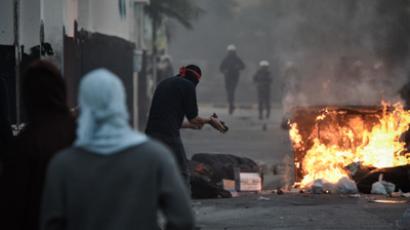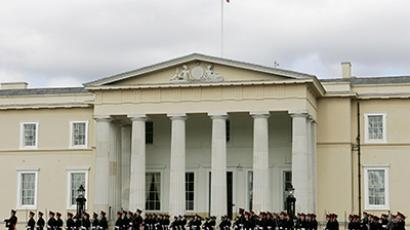Foreign journalists deported as Bahrain engulfed by pre-F1 protests

Two Bahraini anti-government protesters were injured on Saturday following clashes with police, who used teargas and rubber bullets. Three foreign journalists were deported from the country as F1 is to kick off.
Clashes in Bahrain have continued overnight with two people injured in an attack on police, AFP reports, adding practice sessions for Sunday's Formula 1 race at the Sakhir circuit in the south were unaffected by the unrest.
Protests and clashes broke out in nearly 20 villages on Friday evening and night, according to Sayed Yousif al-Muhafda from the Bahrain Center for Human Rights.
"The riot police came and attacked them with teargas and shotguns and rubber bullets," Muhafda said to Reuters.
Government officials have been trying to downplay the scale of violence, describing the overnight clashes as "the normal sort."
"They are trying to exaggerate for the media before the Formula One race. They are working very hard to show a bad image of Bahrain," Information Minister Samira Rajab said.

On Friday three journalists working for Britain’s ITV were asked to leave Bahrain. The country’s Information Affairs Authority (IAA) explained the ITV team was deported because it “exercised media activities without obtaining a license from the competent authorities.”
ITV, however, insists its journalists had the media visas necessary to work in the country.
"Our news team were on assignment with visas approved by the Bahraini authorities," a spokeswoman for ITV News is cited by The Guardian.
Last year, Bahrain denied entry to many journalists, including those representing the media holding rights to broadcast Formula 1 grand prix.
ITV Journalists were expelled on Friday, the same day the US Department of State issued its 2012 country report, pointing at Bahrain’s human rights violations.
“In practice the government limited freedom of speech and
press through active prosecution of individuals under libel,
slander, and national security laws; firing or attacking civilian
and professional journalists; and proposing legislation to limit
speech in print and social media,” the report says.

Among specific examples of the violations, the report gives details the case of human rights activist Nabeel Rajab, who “was arrested on multiple occasions for separate charges related to the content of his social media posts and illegal gatherings.”
Another leading human rights activist in Bahrain, Jihan Kazerooni, vice-president of the Bahrain Rehabilitation and Anti-Violence Organization (BRAVO), spoke to RT and described Nabeel as the most prominent human rights activist now in Bahrain.
“Nabeel Rajab was the only voice who was talking on behalf of the people to the media and he was in contact with the human rights organizations. And he was supportive of all the families in Bahrain… Before he was arrested, every time you could find people in his house talking about the violations happening to them,” Kazerooni said.
She is also one of the organizers of the ‘Don’t forget Nabeel Rajab’ campaign, but complains it’s too difficult to perform human rights activity in Bahrain, as there’s pressure on such organizations in Bahrain. BRAVO had to be registered outside the country.
“Unfortunately we don’t have that much power to improve the situation. What we can do is just document the cases and deliver it to human rights organizations,” said Kazerooni, who believes Washington could contribute to stopping the violence but is doing nothing.


Violence in Bahrain has escalated this week, with protesters opposing F1 as an event that overshadows the country’s poor human rights record and lack of democracy.
On Friday the pre-race unrest reached its peak, with protesters throwing petrol bombs and Bahraini riot police firing teargas and stun grenades at demonstrators.
Eighty people have been killed in clashes in Bahrain since the Arab Spring inspired an uprising in February 2011, according to human rights groups.














